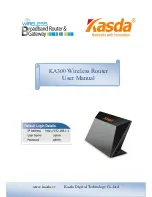
Santé Canada affirme que la littérature scientifique actuelle n'indique pas qu'il faille prendre des
précautions particulières lors de l'utilisation d'un appareil sans fil. Si vous voulez réduire votre
exposition encore davantage, selon l'agence, vous pouvez facilement le faire en réorientant les antennes
afin qu'elles soient dirigées à l'écart de l'utilisateur, en les plaçant à une distance d'éloignement
supérieure à celle recommandée ou en réduisant la puissance de sortie de l'émetteur.
Additional Information on RF Exposure
You can find additional information on the subject at the following links:
•
Cisco Systems Spread Spectrum Radios and RF Safety white paper at this URL:
http://www.cisco.com/warp/public/cc/pd/witc/ao340ap/prodlit/rfhr_wi.htm
•
FCC Bulletin 56: Questions and Answers about Biological Effects and Potential Hazards of Radio
Frequency Electromagnetic Fields
•
FCC Bulletin 65: Evaluating Compliance with the FCC guidelines for Human Exposure to Radio
Frequency Electromagnetic Fields
You can obtain additional information from the following organizations:
•
World Health Organization Internal Commission on Non-Ionizing Radiation Protection at this
URL:
www.who.int/emf
•
United Kingdom, National Radiological Protection Board at this URL:
www.nrpb.org.uk
•
Cellular Telecommunications Association at this URL:
www.wow-com.com
•
The Mobile Manufacturers Forum at this URL:
www.mmfai.org
Administrative Rules for Cisco Aironet Access Points in Taiwan
This section provides administrative rules for operating Cisco Aironet access points in Taiwan. The
rules for all access points are provided in both Chinese and English.
Distance d'éloignement
Fréquence
MPE
Distance
Limite
2.4 GHz
2.9 W/m
2
20 cm (7.87 inches)
5.4 W/m
2
5 GHz
3.8 W/m
2
9.2 W/m
2






































